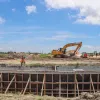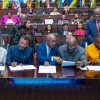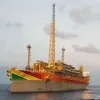2018: ICJ Proceedings
In 2018, the ICJ confirmed its jurisdiction over the case. Venezuelan Foreign Minister Jorge Arreaza maintained Venezuela's opposition, stating, "We stand firm in our belief that this dispute must be resolved through direct negotiations, not imposed rulings." Guyanese Foreign Minister Carl Greenidge welcomed the ICJ's decision, calling it "a victory for international law and the rule of justice."



